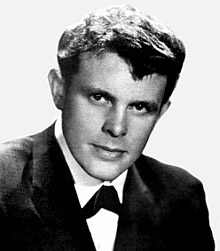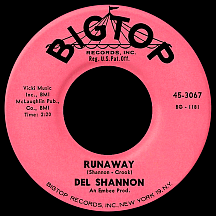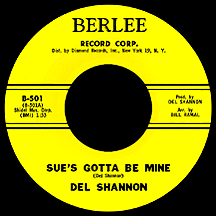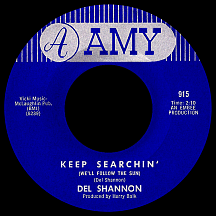DEL SHANNON
Two musicians embarked on a wild music industry ride in the late 1950s at a night spot called the Hi-Lo Club, located inside the LaSalle Hotel in downtown Battle Creek, Michigan. Charles Westover, who later came up with the name Del Shannon, played guitar and sang in a crackly tenor that frequently accelerated to a falsetto capable of being heard blocks away. Maxfield Crook, who eventually adopted the stage name Maximilian, was obsessed with electronic experimentation; he played a keyboard instrument he called a "musitron," which he had modified from a clavioline, its trademark being a high-pitched, reverberating "outer space" sound. This unusual partnership achieved fame far beyond the Great Lakes area when Shannon's "Runaway" became the nation's biggest hit in the spring of 1961.
Growing up in the farmlands of Coopersville, near Grand Rapids, Westover had little to spark his imagination until his mother gave him a ukulele, which he practiced day and night until he could earn a few dollars to buy his first guitar. Influenced by the harmonies of '40s stars The Ink Spots, he began singing during high school, testing out the echo in the gym's locker room where he often reached that falsetto sweet spot, fascinated by how far his voice would carry. Shortly after graduation he was drafted, splitting four years' service that began in 1954 between Fort Knox, Kentucky and Stuttgart, Germany, performing for several months in the Army's Special Services Division as a member of a group called The Cool Flames.
Returning to the states in 1958, Westover moved to Battle Creek, married, and settled into a dullsville routine as, among other things, a carpet salesman. Doug DeMott and his Moonlight Ramblers, a country band with a record release ("I'm Steppin' Out Tonight" on the Excellent label), were regulars at the Hi-Lo Club; a spot opened up for a guitarist and Charles was hired on a part-time basis. After one too many liquor-fueled incidents, DeMott was fired by the club owner and Westover was tapped to lead the band. He refigured the group as Charlie Johnson and the Big Little Show Band, taking the Johnson name for a short time; of the group's original members, only bassist Loren Dugger remained. Max Crook, who lived in Ann Arbor (due east of Battle Creek near Detroit), showed up one night and was hired to play organ. Ollie McLoughlin, a black deejay at WHRV in Ann Arbor and a friend of Max's, got involved and set out to get Westover and Crook in the door at one of Detroit's record companies.
Talent Artists was the name of a Motor City-based agency owned by Harry Balk and Irving Micahnik; a demo tape of Charles and Max was all Ollie needed to get them signed with the company. They urged the pair to come up with better stage names; Crook became Maximilian and Westover chose "Del" after the Cadillac Coupe de Ville, a car he hoped to own someday, and "Shannon" after an aspiring Battle Creek wrestler whose name he liked. Before long an arrangement was made with Bigtop Records, a New York label started in 1958 and run by Johnny Bienstock (Bobby Pedrick, Jr. and Sammy Turner were the label's earliest hitmakers).
Two songs Shannon and Crook had written together, "Little Runaway" (later shortened to "Runaway") and "Jody," were recorded with Del's vocals (and Crook's musitron) at New York's Bell Sound Studio in January 1961, in addition to a couple of instrumentals to be released under the Maximilian name. Seasoned session guitarist Al Caiola played on the session; Shannon balked at Balk's lack of faith in his own guitar playing skills. The finished take of "Runaway" was quite unlike anything else at the time and became an immediate hit, reaching number one on the national charts in mid-April and staying there until mid-May. Everyone got a piece of the action on the million-selling smash: the single was "An Embee Production" (which stood for Micahnik and Balk's initials) and McLaughlin shared in the publishing royalties. This business arrangement stayed in place for several years.
The decision to give up his day job had been a wise one. Del's impact was immediate; second release "Hats Off to Larry," another Shannon-Crook song, took off that summer and made the top ten. Two solo compositions by Del, "So Long Baby" and "Hey! Little Girl," also featuring his tenor-and-falsetto sound and Crook's spacy musitron (with an added bonus, a wacko kazoo break, on the former), were top 40 hits later in the year. Hitmaking instrumental band Johnny and the Hurricanes of Toledo, Ohio, a Harry Balk discovery signed to Bigtop at the time, often backed Shannon and Crook in the studio on these early efforts.
Shannon found it impossible to extend his spectacular '61 debut into the next year, at least in America, but in England he had gone top ten with all four singles, leading to an appearance in It's Trad, Dad!, a U.K. feature (titled Ring-A-Ding Rhythm! in the U.S.) directed by Philadelphia-born Richard Lester (who went on make a name as the director of The Beatles' first fab film A Hard Day's Night). Gene Vincent, Gary (U.S.) Bonds, The Paris Sisters, Gene McDaniels and Chubby Checker represented U.S. rock and roll in an otherwise traditional jazz lineup (with a few Brit teen acts thrown in); Shannon's selection in the film, "You Never Talked About Me," wound up on the flip side of "The Swiss Maid," a poignantly melancholy song that was the first of Shannon's singles he didn't compose; it was penned by up-and-coming country singer Roger Miller. Like Del's other releases that year it had a brief chart showing, but ranked among his biggest hits in England, peaking at number two.
The instrumental singles by Maximilian (sometimes spelled Maximillian) didn't catch on in the U.S. but achieved some success in Canada (primarily in Toronto, Ontario and Vancouver, British Columbia); "The Twistin' Ghost" (on Bigtop) and "Greyhound" (on Twirl, a label owned by Balk), were mid-charting hits there in 1962. Del's drought ended in late '62 when he teamed with a new writing partner, Maron McKenzie, for "Little Town Flirt," featuring girl group backing from The Young Sisters, another Balk-managed act coming off a minor seller, "Casanova Brown" on Twirl; "Flirt" was Del's biggest hit since "Hats Off," nearly reaching the top ten in February 1963. Next up: "Two Kinds of Teardrops," another Shannon-McKenzie tune, Del's seventh U.K. top ten.
This unexpected popularity overseas, more striking even than his success in the U.S., resulted in a tour of England in the spring of '63 and a fateful appearance at London's Royal Albert Hall on April 18, sharing the stage with Matt Monro, The Springfields and the Beatles, fresh off their second hit, "Please Please Me." Impressed by the group's latest single, "From Me to You" (which put them at number one for the first time a couple of weeks later), Del recorded his own version at West End Studios with arranger Ivor Raymonde before returning home; the John Lennon-Paul McCartney song, released as his very next single, entered the U.S. charts in June, giving it the distinction of being the first version of a Beatles song to chart in America...seven months before the Fab Four mounted their historic no-holds-barred takeover of the U.S. music scene.

Del desperately wanted to break away from the control Balk and Micahnik held over his career. He started his own label, Berlee, and released "Sue's Gotta Be Mine," a catchy effort in the same vein as the Bigtop discs (and there was no one to prevent him from playing guitar!), but this and one other single sold poorly and before long he and Max were once again in cahoots with Harry Balk and company, who secured them a new deal with Amy records. A remake of Jimmy Jones' 1960 hit "Handy Man," an unusual choice but a song well-suited to his urgent falsetto style, returned him to the top 40 late in the summer of '64. Right around this time, Dearborn, Michigan instrumental group The Royaltones (best known for "Poor Boy" in '58) became Del's regular backing band while waxing a few rocking instro discs on sister label Mala. "Do You Want to Dance" fared almost as well for Del as the previous 45 (Bobby Freeman's six-year-old smash also provided The Beach Boys with a hit just a few months later; Freeman was back in the spotlight at the time, demonstrating how to dance the "Swim" on TV, in concert and on the charts).
The double-top ten success of 1961 was about to be repeated, though with a slight modification. During a tour of Australia with The Searchers and Peter and Gordon in the fall of 1964, Del played a song he had written, "I Go to Pieces," for both acts; the British duo, riding high with their third consecutive Lennon-McCartney-penned hit in a row, decided to mix things up and record the song. Back in the states a month later, Shannon's "Keep Searchin'" ('...if we gotta keep on the run, we'll follow the sun-ah, wee-ooo!') began its climb, peaking in the top ten in January '65. Peter and Gordon's impressive rendition of his song ('...I go to pieces and I almost die, every time my baby passes by') followed right behind, going top ten in February.
"Stranger in Town," a cool sequel to "Keep Searchin'" with an unsettling scenario concerning the title antagonist, hit the top 40 in March. Other releases on Amy fell by the wayside and Del toured Britain again, this time with Roy Orbison. He split from Balk and Micahnik for good in 1966 and signed with major Los Angeles label Liberty Records. For the next few years he worked with producers Snuff Garrett and Leon Russell, occasionally producing himself, but aside from a remake of Miss Toni Fisher's '59 hit "The Big Hurt" (using a "phasing" effect similar to Fisher's original), a brief chart entry in May '66, there was little to distinguish his three years with the label.
Disheartened by his lack of success with a company he'd initially felt had the resources to regenerate his career, Shannon nevertheless kept punchin' away. He covered The Rolling Stones' "Under My Thumb" from the monster '66 album Aftermath; while not a hit single, the original had already received a great deal of airplay and essentially buried Del's disc. His recording of Tommy Boyce and Bobby Hart's "She" came out simultaneous with The Monkees' version on the their blockbuster sophomore LP More of the Monkees, which was all over radio in '67; again, he had been foiled by an act much hotter than he. The Stones' producer, Andrew Loog Oldham, who was a fan of Del's, met him during yet another U.K. tour and sold him on the idea of updating his signature song. Del resisted but gave in when Oldham assembled a top-notch lineup of British session musicians; the 1967 version of "Runaway," a spectacularly orchestrated production set to a slower tempo than the original, may have been a thrill to make, but it didn't catch on; the original has rightly stood the test of time.
After parting with Liberty, Shannon achieved success behind the scenes. He discovered the band Smith (fronted by dynamic singer Gayle McCormick) playing in a Los Angeles-area club and helped get them a contract with Dunhill Records (a label he had just been signed to), resulting in their rock remake of The Shirelles' 1962 hit "Baby It's You" landing in the top ten in the fall of 1969. He began working with Brian Hyland that year and, still on an "oldies" kick, produced Hyland's top ten comeback record, "Gypsy Woman" (first recorded by The Impressions in 1962) and its follow-up, "Lonely Teardrops" (the classic '57 Jackie Wilson smash).
Remaining with Dunhill until 1972, Del worked for a time with The Robbs at what became the Cherokee Studio, owned and operated by the brother act. Over the course of the decade he recorded for United Artists and Island Records, though with little success. Tom Petty, who counted Del among his main influences, approached him in the early 1980s with the desire to produce an album. Another classic song, Phil Phillips' "Sea of Love," received the Shannon treatment and hit the top 40 in early 1982, breathing new life into his career. In 1985, he popped up in a surprising category: the Warner Bros. single "In My Arms Again" became his one and only country hit.
For most of his life, Del Shannon struggled with his own self-worth, trying to comprehend his purpose in the music career he'd chosen. The mid-1980s country phase preceded a steep downward spiral, leading to divorce from his wife of more than 30 years and, in 1990, his self-inflicted death at age 55. This last shocking fact can dampen an appreciation of an artist's music, but Del's wonderful recordings overshadow his tragic end. He experienced some amazing things: an explosive emergence in 1961 with one of the decade's most-loved hits, an artistic and commercial resurgence a few years later as a songwriter and singer, and creative satisfaction working with other artists, both promising newcomers and seasoned stars. Overall, it's a body of work to be proud of.
NOTABLE SINGLES:
- Runaway - 1961
- Hats Off to Larry - 1961
- So Long Baby - 1961
- Hey! Little Girl - 1961
- I Won't Be There /
Ginny in the Mirror - 1962 - Cry Myself to Sleep - 1962
- The Swiss Maid /
You Never Talked About Me - 1962 - Little Town Flirt - 1963
- Two Kinds of Teardrops - 1963
- From Me to You /
Two Silhouettes - 1963 - Sue's Gotta Be Mine - 1963
- That's the Way Love Is - 1964
- Handy Man - 1964
- Do You Want to Dance - 1964
- Keep Searchin' (We'll Follow the Sun) - 1965
- Stranger in Town - 1965
- Break Up - 1965
- Move it on Over - 1965
- The Big Hurt - 1966
- Under My Thumb - 1966
- She - 1967
- Comin' Back to Me - 1969
- Sea of Love - 1982




